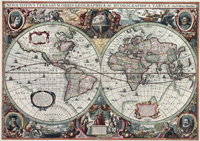Lost Tropical Treasures
Restoring a lost part of history
While researching Treasures of the Tropical Variety, a new understanding of heritage once locked fathoms below the sea found its way to the surface. Intriguing and absolutely fascinating mysteries eccentric to a way of life which persists to this day; treasure mysteries that now bring realizations and new understandings. The world's maritime history is an important part of who we are and a vital way to understand how life was, long before highway corridors, metropolis cities, and before benefits of modern technology. Treasure hunting today is not the same as it was hundreds of years ago even though eighty percent of the world's trade still travels by water. The days of privateers and pirates have steadily succumbed to more civilized practices conscientious of preserving fragile heritage sunken below the seas. Where outlaw and pillagers were once comfortably untouched while profiting off lost treasures, governments have stepped in to protect cultural heritage for the enjoyment of generations to come.

Lives, ships, or treasure lost at sea weigh heavily on society and its economies. The oceans provide passage for people to easily move themselves and goods between continents, but the waters can be dreadfully unforgiving and quick to swallow those who coast across. Legends describing the Kraken may hold merit, not in the sense of an actual ship-devouring sea monster, but as a metaphor of what the vast oceans are ultimately capable of. It is this, the perseverance of ship captains and their crews determined to make port. Those who fight long hours in unfavorable weather to bring people and supplies across the seas, fulfilling an almost saint-like duty. A diligent plight without doubt a most courageous testament to mankind's ability to adapt and overcome. The ability to navigate and survive some of the greatest expanses of our planet eventually develops into its own way of life, one which brings new worlds, discoveries, and knowledge within reach.
Moreover, ship captains and crews over hundreds of years have created opportunity while helping facilitate the advancement of mankind. Sea faring vessels helped distribute cultures into all four corners of the globe and brought with them supplies to sustain life for some time. Over many years the sailing process has enabled people and technology to flourish. In the face-paced modern world, sea shipping may be easily taken for granted by those not working in directly related professions. The benefits, however, are incredibly significant in that everyone is affected by ocean trade is daily life. For the casual treasure hunter who humbly respects historical significance, preservation limits an ability to freely explore lost wrecks in hopes of an ultimate payday. Yet, divers still work creatively to find new ways of discovery within those limitations beyond their control. Competition against big exploration corporations with unlimited resources severely hamper the chances of independent divers uncovering the next biggest find of the century. To many underwater explorers, and even select corporations, the thrill isn't necessarily money-orientated, and is instead for discovery itself.
Of course, business ventures are interested first in returns to fund and continue operations, but the admiral driving factor goes beyond the value of any monetary investment. For a treasure hunter to say they found lost heritage, by thoroughly researching and working diligently to realize the goal above all odds, there is a true sense of achievement. To establish and pursue the quest of restoring artifacts of historical importance to civilizations, risking their own life for others to benefit. Then it is realized, treasure hunting is about its whole contribution to mankind above and beyond monetary worth. For the bigger picture, a purpose of advancing our understanding of past life on the planet and improving underwater archaeology as a respected and necessary science. To one day turn around, fulfilled in knowing the efforts helped restore a lost part of history for civilizations who may have not been capable of redeeming it themselves. Then, to make the treasure accessible to the public for enjoyment and education. These are major motivating factors in common, and this point is dearly sincere among respected underwater explorers around the world.
